Negotiating the ecological transition in an automotive sector plant: the case of Marelli in Crevalcore
Journal title ECONOMIA E SOCIETÀ REGIONALE
Author/s Pierpaolo Mosaico, Laura Leonelli
Publishing Year 2024 Issue 2024/2
Language Italian Pages 13 P. 61-73 File size 280 KB
DOI 10.3280/ES2024-002005
DOI is like a bar code for intellectual property: to have more infomation
click here
Below, you can see the article first page
If you want to buy this article in PDF format, you can do it, following the instructions to buy download credits

FrancoAngeli is member of Publishers International Linking Association, Inc (PILA), a not-for-profit association which run the CrossRef service enabling links to and from online scholarly content.
The present article aims to provide a non-exhaustive overview of the possible representations that have emerged in the Marelli dispute concerning the issue of ecological transition. The dispute arose following the announcement of the closure of the Crevalcore (Bo) plant by the Kkr group, which justified this decision by citing a forecast of negative company profit per-formance due to the progressive decline in internal combustion engine production expected by 2035. The plant is specialized in the production of invariant components for traditional en-gines. From the outset, the workers have demanded a process of reconversion of the produc-tion site, along with the identification of clear employment guarantees, as a condition for re-solving the dispute. This case study falls within the growing field of studies aimed at examin-ing the ways in which workers and trade unions address the so-called work/environment trade off.
Keywords: Ecological Transition, Just Transition, Trade Unions
Jel codes: J51, J52, O44
- Rugiero S. (2021). Sindacato e transizione energetica tra nuovi orientamenti culturali e pratiche di giusta transizione. Quaderni di rassegna sindacale, 2: 63-73.
- Andretta M., Gabbriellini F., Imperatore P. (2023). Un ambientalismo di classe. Il caso Gkn. Sociologia del Lavoro, 165(1): 133-154. DOI: 10.3280/SL2023-165007
- Barca S. (2012). On working-class environmentalism: a historical and transnational overview. Interface: a journal for and about social movements, 4(2): 61-80.
- Barca S., Leonardi E. (2018). Working-class ecology and union politics: a conceptual topology. Globalizations, 15(4): 487-503. DOI: 10.1080/14747731.2018.1454672
- Felli R. (2014). An alternative socio-ecological strategy? International trade unions’ engagement with climate change. Review of International Political Economy, 21(2): 372-398. DOI: 10.1080/09692290.2012.761642
- Fim-Fiom-Uilm Territorio di Bologna (2023a). Marelli: si prosegue con le mobilitazioni - Comunicato Stampa. Crevalcore 4 ottobre.
- Fim-Cisl, Fiom-Cgil, Uilm-Uil, Fismic, Ugl, Aqcf (2023). Marelli: inaccettabile la chiusura di Crevalcore - Comunicato Stampa. Roma, 9 novembre.
- Gaddi M., Garbellini N. (2023). The Italian Government’s industrial policies in the automotive sector. International Journal of Automotive Technology and Management, 23(1): 22-41. DOI: 10.1504/IJATM.2023.129640
- Galgóczi B. (2022). From a “just transition for us” to a “just transition for all”. Transfer: European Review of Labour and Research, 28(3): 349-366. DOI: 10.1177/10242589221125066
- Heffron R.J. (2018). The application of distributive justice to energy taxation utilising sovereign wealth funds. Energy policy, 122(November): 649-654.
- Kalt T. (2021). Jobs vs. climate justice? Contentious narratives of labor and climate movements in the coal transition in Germany. Environmental Politics, 30(7): 1135-1154. DOI: 10.1080/09644016.2021.1892979
- Mandelli M., Sabato S., Jessoula, M. (2021). EU economic governance and the socio-ecological transition: Towards a more sustainable European semester?. Social policies, 8(3): 619-638. DOI: 10.7389/102759
- Mandelli M., Novelli L. (2022) Trade unions facing the eco-social-growth trilemma: prospects and hurdles for a just transition solution to the Taranto crisis. European Trade Union Institute, European Climate Foundation -- <www.etui.org>.
- Rathzel N., Uzzell D.L. (2013). Trade unions in the green economy. London: Routledge. DOI: 10.4324/9780203109670
- Räthzel N., Cock J., Uzzell D. (2018). Beyond the nature-labour divide: trade union responses to climate change in South Africa. Globalizations, 15(4): 504-519. DOI: 10.1080/14747731.2018.1454678
- Silva J.M., Carley S., Konisky D.M. (2023). “I earned the right to build the next American car”: How autoworkers and communities confront electric vehicles. Energy Research & Social Science, 99(May).
- Stevis D., Felli R. (2015). Global labour unions and just transition to a green economy. International Environmental Agreements: Politics, Law and Economics, 15(1): 29-43.
- Thomas A., Doerflinger N. (2020). Trade union strategies on climate change mitigation: Between opposition, hedging and support. European Journal of Industrial Relations, 26(4): 383-399. DOI: 10.1177/0959680120951700
- Tomassetti P. (2021). Just Transition and Industrial Relations: The Italian Patterns. E-Journal of International & Comparative Labour Studies, 10(1): 52-66.
- Wang X., Lo K. (2021). Just transition: A conceptual review. Energy Research & Social Science, 82(December): 102291.
- Wissen M., Brand U. (2021). Workers, trade unions, and the imperial mode of living: labour environmentalism from the perspective of hegemony theory. In: Räthzel N., Stevis D., Uzzell D., Eds. The Palgrave Handbook of Environmental Labour Studies. Cham: Palgrave Macmillan. DOI: 10.1007/978-3-030-71909-8_30
Pierpaolo Mosaico, Laura Leonelli, Negoziare la transizione ecologica in uno stabilimento del settore automotive. Il caso della Marelli di Crevalcore in "ECONOMIA E SOCIETÀ REGIONALE " 2/2024, pp 61-73, DOI: 10.3280/ES2024-002005